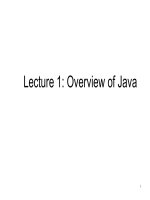Lecture Essay writing & presentation skills - Lecture 1: Discussion of course contents
Bạn đang xem bản rút gọn của tài liệu. Xem và tải ngay bản đầy đủ của tài liệu tại đây (209.88 KB, 39 trang )
I am Anila Nosheen from
COMSATS
Institute
of
Information
Technology,
Islamabad. I have done my
Masters in English (Linguistics &
Literature)
from
National
University of Modern Languages
(NUML), Islamabad. I did my
MPhil from International Islamic
About the Course
Essay Writing
&
Presentation
Skills
COURSE DESCRIPTION
•
ENG406
is
Essay
Writing
and
Presentation Skills course designed for
students to:
–
develop knowledge of essay crafting skills
–
presentation techniques
3
LEARNING OUTCOMES
•
After successfully completing ENG406, the
student will be able to:
• Write variety of essay styles (narrative,
descriptive, expository, persuasive)
• Write for a variety of purposes and audiences
• Apply the writing process (prewriting, writing, and
revising)
• Demonstrate basic grammar and sentence skills
in writing
4
What is an Essay?
•
•
An essay is an organized
collection of your thoughts on a
particular topic.
An essay consists of three major
parts:
1.
Introduction
2.
Main body
3.
Conclusion
5
What is an Essay?
•
Essays can be either:
o
Long or Short
o
Serious or Humorous
o
Formal or Informal
o
Can describe your opinions
or be a synopsis of
expert
6
Course Contents
32 Lectures= 32 Topics
on Essay Writing and Presentation Skills
7
1. Language and
Communication Skills
•
Listening
•
Speaking
•
Reading
•
Writing
8
Receptiv
e Skills
Producti
ve Skills
9
10
2. The Writing Skill
•
Writing styles
–
Formal writing
•
–
Essays, Reports, Proposals, Letters,
Memorandums, Thesis etc
•
Follow a specific format
•
Specific contents
•
Written for specific audience
Informal writing
•
•
Articles, Creative writing etc
11
3.
•
•
What is Essay?
Definition & Characteristics
Essay and Paragraph (similar yet
different)
–
An essay is an organized collection of your
thoughts on a particular topic.
–
Topic Sentence (Beginning)
–
Supporting Details (Middle)
–
Closing Sentence (End)12
3.
What
WhatisisEssay?
an Essay?Cont..
Writers use essays to:
•
Describe or define a subject (What is Life?)
•
Compare related items in a subject
(The Difference Between Apples and Oranges)
•
Show cause and effect (If You Write It, They Will
Read)
•
Write a narrative (My Summer Vacation)
•
Explain a process (How to Write an Essay)
•
Deliver an argument (The Case Against Essay
13
Questions)
4. The Writing Process
•
§
Pre-writing Stage
o
Pre-writing
o
Free-writing
o
Note keeping
o
Brain storming
o
Mind Mapping
o
Clustering
o
Tree Diagram etc
Writing Stage
14
5. Types of Essays
•
There are many different kinds of essays. The following are
a some of the most common ones that we are going to study
in this course:
•
Descriptive Essay
•
Definition Essay
•
Process Essay
•
Compare/Contrast Essay
•
Academic Essay
•
Cause/Effect Essay
•
Narrative Essay
15
6. Writing an Essay with the
help of outline
•
•
•
•
An essay outline is probably the most
important friend you will have while writing
your essay.
It is the skeleton of your ideas.
It is the framework by which you will write
an essay.
It is difficult to write one without an outline.
16
7. Essay Organization
•
Common methods of beginning
•
Cohesion
–
•
means connecting your ideas together in a
logical way, depending on the type of essay
you are writing.
Coherence
–
means using pronouns, conjunctions etc to tie
the ideas in your essay together.
17
8. Descriptive Essay
1.
Descriptive Essay:
–
The descriptive essay provides details about
how something looks, feels, tastes, smells and
makes one feel, or sounds.
–
It can also describe what something is, or how
something happened.
–
These essays generally use a lot of sensory
details.
–
The essay could be a list-like description that
provides point by point details.
18
2. Definition
8. Definition
EssayEssay
•
A
definitio
19
10. Process Essay
•
•
It describes how to do something or tell
how something happens.
When readers finish this type of essay,
they get to know how to do something that
they didn't know before
20
11.
Compare/Contrast Essay
Essay
3. Compare/Contrast
The
compare/co
ntrast essay
21
12. Cause/Effect
Essay
4. Cause/Effect
Essay
The cause/effect essay explains why or how
some event happened, and what resulted from
the event.
•
•
A cause essay usually discusses the
reasons why something happened
An effect essay discusses what happens
after a specific event or circumstance.
Examples: A cause/effect essay may explain . . .
22
13. Narrative
Essay
5. Narrative
Essay
The narrative essay tells a story. It can
also be called a "short story."
•
Conversational in style
•
Tells of a personal experience
Examples: A narrative essay could tell
of ...
* my brother's and my fishing trips;
23
14. Argumentative
(persuasive) Essay
An argumentative essay is one that attempts
to persuade the reader to the writer's point of
view.
The writer can either be serious or funny, but
always tries to convince the reader of the validity
of his or her opinion.
Examples: An argumentative essay may persuade a
reader that . . .
* he or she should use public transportation
instead of driving
24
15. Critical
EssayEssay
7. Critical
A critical essay analyzes the strengths,
weaknesses and methods of someone else's work.
A critical essay can be written about another
essay, story, book, poem, movie, or work of art.
Examples: A critical essay may analyze . . .
*
how Shakespeare presents the character, Hamlet, in
his play, Hamlet;
*
the strengths and weaknesses of the movie, Bol;
25









